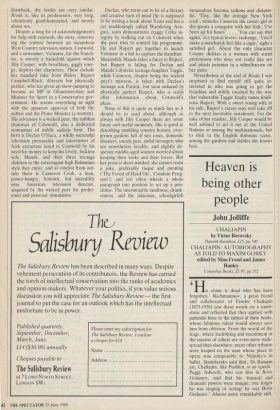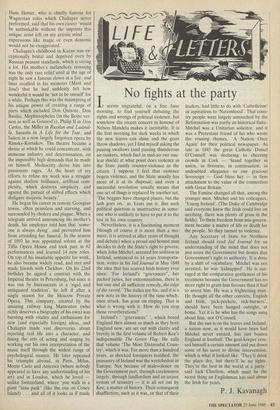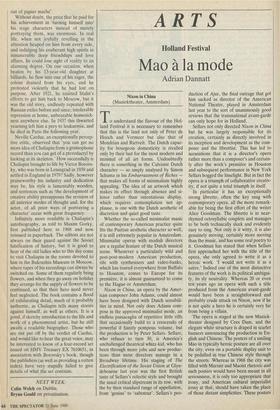Heaven is being other people
John Jolliffe
CHALIAPIN by Victor Borovsky
Hamish Hamilton, f25, pp.540
CHALIAPIN: AUTOBIOGRAPHY AS TOLD TO MAXIM GORKY edited by Nina Froud and James Hanley
Columbus Books, £5.95, pp.352
He alone is dead who has been forgotten.' Rachmaninov, a great friend and collaborator of Feodor Chaliapin (1873-1938) saw these words on a tomb- stone and reflected that they applied with particular force to the subject of these books, whose fabulous talent would always save him from oblivion. From the world of the stage, where backbiting and resentment at the success of others are even more wide- spread than elsewhere, many other tributes were heaped on the man whose place in opera was comparable to Nijinsky's in ballet. Stanislaysky said that, 'In Russian art, Chaliapin, like Pushkin, is an epoch.' Peggy Ashcroft, who saw him in Boris Godunov, said that his 'musical and dramatic powers were unique; one forgot he was singing or acting; he was Boris Godunov.' Almost more remarkable still,
Hans Hotter, who is chiefly famous for Wagnerian roles which Chaliapin never performed, said that his own career 'would be unthinkable without the imprints this unique artist left on my artistic mind . . . expressions like magic or even demonic would not be exaggerated.'
Chaliapin's childhood in Kazan was ex- ceptionally brutal and deprived even by Russian peasant standards, which is saying a lot. His mother's melancholy crooning was the only rare relief until at the age of eight he saw a famous clown at a fair, and later recalled in his memoirs (Mask and Soul) that he had suddenly felt how wonderful it would be 'not to be oneself' for a while. Perhaps this was the mainspring of his unique power of creating a range of parts which included Don Quixote, Don Basilio, Mephistopheles (in the Boito ver- sion as well as Gounod's), Philip II in Don Carlos, the Miller in Russian and Ludrnil- la, Susanin in A Life for the Tsar, and Salieri in a now largely forgotten opera by Rimsky-Korsakov. The theatre became a shrine at which he could concentrate, with immense industry and determination, on the impossibly high demands that he made on himself. Mediocrity drove him into passionate rages. 'At the heart of my efforts to refine my work was a struggle against shallow brilliance, artificial com- plexity, which destroys simplicity, and against the pursuit of stilted effects which disfigure, majestic beauty.'
He began his career in remote Georgian towns, often penniless and starving, and surrounded by cholera and plague. When a telegram arrived announcing his mother's death, his employer told him that 'some- one is always dying', and prevented him from attending her funeral. In the season of 1893 he was appointed soloist at the Tiflis Opera House and took part in 62 performances and learned 14 new roles. On top of his insatiable appetite for work, he also became widely read, and met and made friends with Chekhov. On his 22nd birthday he signed a contract with the Imperial theatre in Petersburg, but since it was run by bureaucrats in a 'rigid and antiquated tradition', he left if after a single season for the Moscow Private Opera. This company, created by the amazing railway king Mamontov (who richly deserves a biography of his own) was bursting with vitality and enthusiasm for new (and especially foreign) ideas, and Chaliapin made vast discoveries about injecting real life into a character, and fusing the arts of acting and singing by working out his own interpretation of the music itself through the widest range of psychological nuance. He later repeated his triumphs abroad, in Paris, Milan, Monte Carlo and America (where nobody appeared to have any understanding of his art) and in London, which he loved unlike Switzerland, where 'you walk in a giant "luna park" (like the one on Coney Island) . . . and all of it looks as if made out of papier mache'.
Without doubt, the price that he paid for his achievement in 'turning himself into' his stage characters instead of merely portraying them, was enormous. In real life, when not joyfully revelling in the attention heaped on him from every side, and indulging his exuberant high spirits in innumerable deep friendships and love affairs, he could lose sight of reality to an alarming degree. On one occasion, when beaten by his 13-year-old daughter at billiards, he flew into one of his rages, the colour drained from his eyes, and he protested violently that he had lost on purpose. After 1921, he resisted Stalin's efforts to get him back to Moscow, but it was the old story, endlessly repeated with Russian exiles before and since; intolerable repression at home, unbearable homesick- ness anywhere else. In 1937 this thwarted yearning left him a prey to leukaemia, and he died in Paris the following year.
Neville Cardus, an exceptionally percep- tive critic, observed that 'you can get no more idea of Chaliapin from a gramophone record than you can get of a pterodactyl by looking at its skeleton.' How successfully is Chaliapin brought to life by Victor Borovs- ky, who was born in Leningrad in 1939 and settled in England in 1979? Sadly, however praiseworthy his industry and dedication may be, his style is lamentably wooden, and sentences such as 'the development of creative ability presupposes the revision of all anterior modes of thought and, for the actor, of all prior ways of portraying a character' occur with great frequency.
Infinitely more readable is Chaliapin's autobiography, as told to Maxim Gorky, first published here in 1968 and now reissued in paperback. The editors are not always on their guard against the Soviet falsification of history, but it is good to hear of the old ladies who to this day come to visit Chaliapin in the rooms devoted to him in the Bakrushin Museum in Moscow, where tapes of his recordings can always be switched on. Some of them regularly bring flowers, and when they go away on holiday they arrange for the supply of flowers to be continued, so that their hero need never feel neglected. The book contains a flood of exhilarating detail, much of it probably authentic, as Chaliapin tells many stories against himself, as well as others. It is a good, if sketchy introduction to the life and work of a phenomenal artist, but he still awaits a readable biographer. Those who are not put off by the verdict of Cardus, and would like to hear the great voice, may be interested to know of a four-record set issued on HMV Treasury EX 7610651, in association with Borovsky's book, though the publishers (as well as providing a rotten index) have very stupidly failed to give details of what the set contains.












































































 Previous page
Previous page